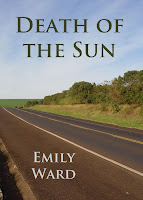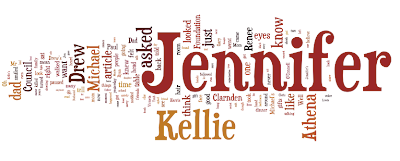
My first book/movie analysis. For this post, after a brief summary, I'll look at
Characters, Setting, Theme, What Was Gained by Film Adaptation, and
What Was Lost by Film Adaptation. If this works, I'll just keep this format for the rest, too.
Everything Is Illuminated was written by Jonathan Safran Foer in 2002. The book is divided into two sections.
The first is the story of a young American Jew, Jonathan, traveling to Ukraine to find the woman who saved his grandfather's life, Augustine. He is led around the country, searching for the shtetl Trachimbrod, by a Ukrainian named Alex and his grandfather. This part is written by Alex and mailed to Jonathan after the journey has ended.
The second section is Jonathan's writings mailed to Alex. It is his fictional account of the history of Trachimbrod. It's very literary and has bits of magical realism.
The movie was released in 2005. It was directed and written by Liev Schreiber. Elijah Wood plays the role of Jonathan, Eugene Hutz Alex, and Boris Leskin Grandfather.
The script only focuses on the story in Ukraine, following their travels around the country in search of Augustine and Trachimbrod.
Setting:
I really enjoyed the setting in the movie. The beautiful countryside, the ornate buildings, the dingy hotel. During Alex's writing in the book, you don't read too much about the landscape or their surroundings. (I'm definitely not complaining - Alex spends a lot of time on their conversations, making humorous Ukrainian-to-English translation mistakes, thinking about American pop culture, and reflecting on what they learned on their journey.)
Because Jonathan's novel sections are taken out, the movie doesn't explore the fantastical Trachimbrod. That might have been really neat in film, but I'm glad they didn't include this section, the movie would have been quite odd and stilted. So, from here on out, I'll just talk about Alex's section and how it was adapted.
Characters:
In any film adaptation, you lost a lot of depth. Film is a like an act of spying into the lives of these characters; books look into their minds.
The Jonathan in the book is a writer. In the movie, he's a collector. He spends a lot of time gathering things and putting them in ziploc bags, and in the beginning of the movie, there's a wonderful scene of his room, where the camera spans all the things he's collected connected to his family: movie tickets, handkerchiefs, jewelry. The "writer" role of the book is a way of showing Jonathan's character to us, and the "collector" role of the movie does this same thing. If Jonathan had solely been a writer, the viewers of the film wouldn't have been able to read his words.
Eugene Hutz was great as Alex. He was a funny, endearing character. The only thing I think the movie is missing is Alex's growth as a character.
(Warning: spoilers from here on out!)
At the end of the book, Alex tells his abusive, drunken father to leave and takes the role of the head man in the house. He also learns things about his grandfather and contemplates what it means to be a bad or good person. The journey to Trachimbrod changes him. He even confesses in the end that he doesn't go to nightclubs or become "carnal" with other women, but it was mostly an act. I didn't feel unfulfilled after watching the movie Alex, but I still felt like he wasn't as deep as the book Alex.
Here's a quote from the book that really signifies Alex's growth, from Alex's POV: "The bruises go away, and so does how you hate, and so does the feeling that everything you receive from life is something you have earned."
The grandfather is given a much different backstory in the movie. In the book, the grandfather gives his Jewish best friend over to the Nazis while they are ransacking his village Kolki. In the movie, the grandfather is a Jewish man who escaped the Nazis and stayed in Ukraine by pretending he wasn't Jewish. I think it was an interesting choice. The story in the book broke my heart; I cried the first time I read, and I was even crying in the library as I read it again yesterday. The story in the movie was moving, but I almost felt like it was too simple. The book version was complex, and you knew the grandfather was a good person, but it made you think about the horrors of war and what people will do to save their lives and the lives of their family. I suppose I like the book version a bit more, but again, just because it gives much more depth and growth to the grandfather.
Theme
The book had many themes. I think the theme about history and its meaning was definitely the stronger in the movie. Jonathan came all the way from America to search for Augustine. When they do find her, she explains the history of Trachimbrod, and we find out the grandfather's history.
Alex says at the end of the movie in a letter to Jonathan, "I have reflected many times upon our rigid search. It has shown me that everything is illuminated in the light of the past. It is always along the side of us, on the inside, looking out. Like you say, inside out. Jonathan, in this way, I will always be along the side of your life. And you will always be along the side of mine."
This echoes Alex's sentiments in the book: "Everything is the way it is because everything was the way it was. Sometimes I feel ensnared in this, as if no matter what I do, what will come has already been fixed."
Lost:
So much can be lost in film adaptation. Obviously, there was no way to translate the power of the written word to the film. In Alex's letters, it even becomes a point of contention between the two of them. Alex wonders why Jonathan continues to write sad, loveless histories for his relatives when "with writing, we have second chances." That was a powerful part of the book for me, but, of course, it's part of the book.
I regret the growth of Alex and his passionate response to his grandfather's suicide.
Gained:
The film adaptation was simpler than the book. At times, the book (especially Jonathan's account of Trachimbrod) can be overwhelming or too "out there." The movie took the relationships and basic journey to find Augustine and put it into a beautiful landscape with talented actors. You still have the melancholiness, the love, the humor, the significance in the past.
The movie is definitely in my top 20 movies, and the book is amazing, too. I recommend both in a heartbeat!
What do you think? About the book? The film? The switch from book to movie?
Some links:
 Death of the Sun
Death of the Sun




